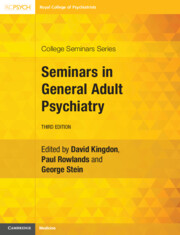Book contents
- Seminars in General Adult Psychiatry
- College Seminars Series
- Seminars in General Adult Psychiatry
- Copyright page
- Reviews
- Contents
- Contributors
- Introduction
- Chapter 1 Clinical Epidemiology
- Chapter 2 Assessment, Formulation and Diagnosis
- Chapter 3.1 Clinical Features of Depressive Disorders
- Chapter 3.2 Causes of Depression
- Chapter 3.3 Drug and Physical Treatments of Depression
- Chapter 3.4 Psychological and Social Treatment of Depression
- Chapter 4.1 Bipolar Disorder
- Chapter 4.2 Bipolar Disorder
- Chapter 5.1 Schizophrenia and Other Primary Psychoses
- Chapter 5.2 Causes and Outcome of Psychosis
- Chapter 5.3 Drug Treatment of the Psychoses
- Chapter 5.4 Psychosocial Management of Psychosis
- Chapter 6.1 Anxiety Disorders
- Chapter 6.2 Post-traumatic Stress Disorder
- Chapter 6.3 Specific Phobias
- Chapter 6.4 Obsessive-Compulsive and Related Disorders
- Chapter 6.5 Functional Neurological Disorder
- Chapter 6.6 Bodily Distress Disorder, Chronic Pain and Factitious Disorders
- Chapter 7.1 Clinical Features and Implications of New Classification of Personality Disorders
- Chapter 7.2 Clinical Approaches to Personality Disorder (AKA Complex Emotional Needs)
- Chapter 7.3 Antisocial and Other Personality Disorders, Impulse Control Disorders, and Non-substance Addictive Disorders
- Chapter 8 Neuropsychiatric Disorders
- Chapter 9 Autism
- Chapter 10 Attention-Deficit/Hyperactivity Disorder
- Chapter 11 Sleep Disorders and Psychiatry
- Chapter 12 Eating Disorders
- Chapter 13 Perinatal Psychiatry
- Chapter 14 Substance Use Disorders
- Chapter 15 Suicide and Self Harm
- Chapter 16 Physical Health Care
- Chapter 17 Culture, Mental Health and Mental Illnesses
- Chapter 18 Psychiatry in Primary Care
- Chapter 19 Psychiatry in the General Hospital
- Chapter 20 Adult Mental Health Services
- Index
- References
Chapter 18 - Psychiatry in Primary Care
Published online by Cambridge University Press: 04 April 2024
- Seminars in General Adult Psychiatry
- College Seminars Series
- Seminars in General Adult Psychiatry
- Copyright page
- Reviews
- Contents
- Contributors
- Introduction
- Chapter 1 Clinical Epidemiology
- Chapter 2 Assessment, Formulation and Diagnosis
- Chapter 3.1 Clinical Features of Depressive Disorders
- Chapter 3.2 Causes of Depression
- Chapter 3.3 Drug and Physical Treatments of Depression
- Chapter 3.4 Psychological and Social Treatment of Depression
- Chapter 4.1 Bipolar Disorder
- Chapter 4.2 Bipolar Disorder
- Chapter 5.1 Schizophrenia and Other Primary Psychoses
- Chapter 5.2 Causes and Outcome of Psychosis
- Chapter 5.3 Drug Treatment of the Psychoses
- Chapter 5.4 Psychosocial Management of Psychosis
- Chapter 6.1 Anxiety Disorders
- Chapter 6.2 Post-traumatic Stress Disorder
- Chapter 6.3 Specific Phobias
- Chapter 6.4 Obsessive-Compulsive and Related Disorders
- Chapter 6.5 Functional Neurological Disorder
- Chapter 6.6 Bodily Distress Disorder, Chronic Pain and Factitious Disorders
- Chapter 7.1 Clinical Features and Implications of New Classification of Personality Disorders
- Chapter 7.2 Clinical Approaches to Personality Disorder (AKA Complex Emotional Needs)
- Chapter 7.3 Antisocial and Other Personality Disorders, Impulse Control Disorders, and Non-substance Addictive Disorders
- Chapter 8 Neuropsychiatric Disorders
- Chapter 9 Autism
- Chapter 10 Attention-Deficit/Hyperactivity Disorder
- Chapter 11 Sleep Disorders and Psychiatry
- Chapter 12 Eating Disorders
- Chapter 13 Perinatal Psychiatry
- Chapter 14 Substance Use Disorders
- Chapter 15 Suicide and Self Harm
- Chapter 16 Physical Health Care
- Chapter 17 Culture, Mental Health and Mental Illnesses
- Chapter 18 Psychiatry in Primary Care
- Chapter 19 Psychiatry in the General Hospital
- Chapter 20 Adult Mental Health Services
- Index
- References
Summary
The psychiatry of primary care, and the work that GPs do, has expanded as a field of interest for psychiatrists beyond its early roots in epidemiological research and studies into the detection of mental disorders by general practitioners. An understanding of the key role of the primary care team in managing often-complex mental health problems in the wider community as well as how to work effectively at the interface in partnership and joint work with GPs is essential not only for general adult psychiatrists but other specialists too – as policy makers, both local to the UK and internationally, continue to recognise its importance. The Pathways to Care model provides a useful framework for understanding how the prevalence of mental illness in the community (particularly for common mental disorders such as anxiety and depression) is distributed and how this changes according to the way that health care systems are organised. Ways of working include collaborative care, social prescribing, brief psychological therapy – including CBT-guided self-help – and antidepressants (although controversies surround their usage), with suicide prevention, shared care with CMHTs and training and education of both groups being prominent issues.
Keywords
- Type
- Chapter
- Information
- Seminars in General Adult Psychiatry , pp. 726 - 738Publisher: Cambridge University PressPrint publication year: 2024

